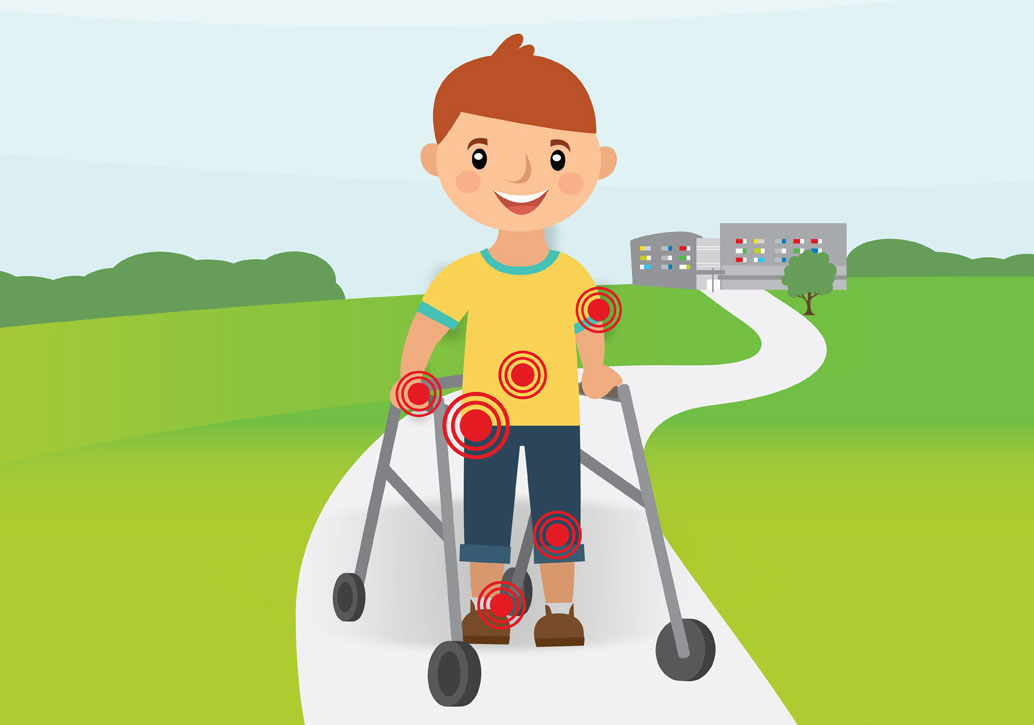How Do Children Experience Pain?
Parenting, Children, and Pain, Part I: How Do Children Experience Pain?
-Dave McNamara
Pain and Parenting
As we come to the end of National Pain Awareness Month, I began reflecting on the challenges of pain and parenting from two different positions.
1. If your child is in pain, how can you best help her/him?
2. If you the parent are in pain, what are the challenges of parenting? How can you be effective while dealing with pain?

Both issues are worth consideration, but in today’s post, we will be focusing on the first question: how can you help your child when they are experiencing pain?
Rather than first quote a specialist, I wanted to talk to a child directly. Recently, my nephew, Sam had his tonsils out. Sam is 9 years old and is a healthy and active child. Since this was his first surgery, however, he was a little concerned about what to expect. The surgery went like clockwork, but the recovery was rough. I wanted to get a better idea of what Sam experienced. Below is a bit of our chat.
Interview
Q: Hey Sam! I appreciate you talking with me. My first question, Sam, is this: how did you feel when you woke up from surgery? did it hurt?
S: It didn't really hurt then, but then it started to hurt when I started trying to talk.
Q: What did the pain feel like to you?
S: It felt like...a very scratchy strep throat. Yeah [I’ve] had a lot of strep before….it was kind of sharp, but not too sharp if I had some medicine...But I [did] when the medicine wore off.
Q: When did you start feeling better after you got your tonsils out?
S: Nine days.
Q: Wow! That’s a long time! Was that hard?
S: It was definitely hard! I wanted to do things with my friends and couldn’t.
Q: How did the pain in your throat go away? Did it just *happen* one day?
S: Yeah. One day I woke up and just...felt better. I swallowed and then I was like, ‘well, I guess it's not hurting anymore!’
Q: That must have been a relief! Was it the worst kind of pain you felt before?
S: I don't think it was the worst pain….[that was] probably when I sprained my ankle the second time….I ended up having to use crutches. It was definitely swollen [and] I could definitely feel that [pain].
Q: Do your mom and dad say or do things when you’re hurting that helps the pain?
S: Well [with my ankle] my dad would, like, stretch [it], and that would help. And [after I had my tonsils out] my mom told me to speak low and that helped because I didn't have to talk as much as I usually do!
Chronic Pain in Children
Sam’s pain threshold is fairly high for a child. He in fact just completed his first Triathalon! Unfortunately, this isn’t often the case. Many children have chronic pain, which is much more difficult than dealing with a child who experiences the kind of normal pain children do. Having a child with chronic pain can also be painful to experience for a loving parent. However, their condition shouldn’t be the defining factor of how you treat them.
Dr. Deborah Barrett addresses this in an article on Psychology Today’s website. She lists important points to keep in mind when parenting children in pain. Read her article for the complete text.
Tips on Parenting Children in Chronic Pain
1. Acknowledge the Difficulties: It doesn’t benefit the child to get them to pretend they aren’t feeling what they’re feeling.
2. See your child, not the illness: As children need calm and control from parents, so do they need to be seen as people worth love, not merely a “problem.”
3. Foster positive self-awareness: The more children are aware of what their feeling, the better they get at telling you what’s hurting.
4. Nurture self-expression: As above, this comes through encouraging the child to be as specific as possible.
5. Validate the difficulties: Knowing someone’s in your corner, and empathizes with you, makes a HUGE difference.
6. Self-care for parents: Burn-out is common. You can’t fully help your child if you yourself are unable to rejuvenate.
7. The value of support: You’re a family. You love each other. You’ve got each other’s back. That love and support will never go away. This is very important for a child to know.
These are still important points for those parents who deal with the pain of any child.
To end, and as a testament to the loving parenting approach for Sam, I’ll leave you with the end of our chat.
Interview, Continued
Q: Sam, are you scared of pain or getting hurt again?
S: I'm not super super scared of pain? I'm not like *scared* of pain. I'm *somewhat* scared. I mean, pain hurts obviously!
Q: Definitely! So, when you, like, do sports and stuff, how do you deal with feelings of maybe being scared of having pain again?
S: I try to be a little cautious, but I mean, I don't want it to *stop* me from doing anything! I mean, okay: I'll try not to do this or that, but if it happens, it happens.
Conclusion
“If it happens, it happens.” Is there any more mature or healthy way of viewing pain in life than that? I can’t think of any.
Reference
Barrett PhD, LCSW, Deborah. ‘Children with Chronic Pain’. 1991. Accessed September 18, 2016. https://www.psychologytoday.com/blog/paintracking/201310/children-chronic-pain.
